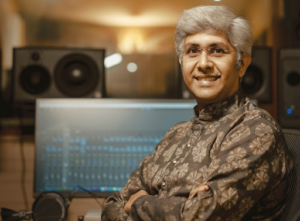We think we listen to music through our ears but our brain, our entire body can take in the vibrations. Music is sound, the sound is vibration. Various points of your spine receive these vibrations, along with your pituitary gland, giving rise to different emotions. Here is the inside story from the music studio of a recording and scoring engineer.
Sound Engineering, Explained
Sound Engineering is like cooking: For something to taste good, you need to know the proportions in which ingredients need to be added, and how the meal has to be served.
In the studio, you have to know the right inputs, the right mix, and what sound should go in what quantity. This also requires an understanding of how the music would be rendered and presented. Additionally, you have to understand the space where the sound is being created. For example, if you go to the Taj Mahal and say “Om,” the sound would stay and the effect it creates is magical. You have to notice how space gives back and then accordingly, record, returning music to that space.
In essence, sound engineering involves the representation of music, knowing what is what and how much of it should come out, how well they are all balanced. It enhances the entire musical experience.
The Shifts in Creation & Consumption of Music
Earlier, people were just playing music that was relevant to them in their area. Then, transportation came, and people discovered other styles from various places. They started exploring and combining because every human mind inherently craves change. This way, transportation, and communication brought cultures together and hence various music styles, forms, and genres came together. Hence, music evolved.
Looking at the changes in the music studio environment, I notice that our recording sessions used to be more like gatherings. Everyone involved in the song came together to create. Everybody came with a strong sense of responsibility. Artistry was very human-dependent and not as tech-dependent as it is now.
I do miss what used to be there, but you have to adapt to the change. We now have an added responsibility to ensure that technology aids art. The rendering should come out in a way that the art stands out and stays, living beyond the artists. My task is to balance the emotional, technical, and artistic aspects as well as provide the ambient support that the artist needs to bring out fantastic performances.
The Role of the Youth in Preserving Classical Music
Change is the law of nature. If you don’t adapt to change, it causes resistance. However, you have to be wise enough to hold on to things where it is necessary. This balance is the responsibility that youngsters must have and carry forward. You have to have the wisdom to understand which change is necessary, or is good for the art, accordingly holding on, or letting go, and adapting.
Efforts should also go into learning and practising classical music. Classical music is not that peppy, and that’s what works more on the internet. It is complex, deep, and connected, even genetically, with human history. Every gene has memory, our culture is really just the celebration of who we are and what we are. If we consistently make efforts to imbibe it, it would come to us organically.
Apart from consuming the information, the human touch is very crucial. You need to find a mentor as a guiding source; the experience will plant a seed that can grow into the fruit-bearing tree. So, the search should also be directed towards identifying inspiration in the humans around us.
Bridge Between Artists & Technology
I found so much more comfort and openness in sound. I saw a whole universe in it. Initially, I wanted to be a tabla player but as I explored sound more and more, I started to do my own things, and eventually, began collaborating. People started coming to my studio for how they felt in my space and the results they got there.
I have been like a boat in a free stream, I kept flowing without any resistance. So, my greatest strength was that I did what I wanted to do, but I never wandered. I started Resound India because of what I felt for music and because of the feedback I received. I followed my intuition and went with wherever it took me. I really dove into things, tried, learned, and practised.
I truly believe that sound chose me; my duty and responsibility was to give my best to it. Like everyone else, I don’t know what the future holds, so I’m flowing while the sound and my art take care of me.
Follow Your Heart & Build Human Connections
When I had to record for the Life of Pi, I did not know about the movie. I was excited because it was for Fox Studios and I had a strong passion for my music. The recording was supposed to happen the following day, and my internet and computer suddenly stopped working. I called Santosh Narayanan in the middle of the night to borrow his equipment but even that could not work. I then somehow configured the system and miraculously, the session happened.
Today, Santosh is an influential film composer but that day he was just a technician, and yet he was there to help. The takeaway here is that we need to help each other along the way, whenever we can. You will see how things turn out later in various forms of rewards, not just awards. Rest your mind and follow your heart. Let it be about passion, not just the project.
(The full interview with Sai Shravanam originally appeared in the Music edition of The Plus magazine. Read on for some excerpts from the conversation.)
About the Contributor:

A skilled musician, music engineer/producer, and entrepreneur, Sai Shravanam has created a benchmark quality in all of his endeavours with a single-minded devotion towards music. Recognised as one of the few classically trained sound designers in the country, Shravanam has developed his talents through years of experience in recording music, bringing musicians the masterful chemistry necessary to produce their best. Having worked on films like Life of Pi, The Man Who Knew Infinity, and many others, Shravanam recently became the first sound recordist to be honoured with the Tamil Nadu government’s Kalaimamani award.

